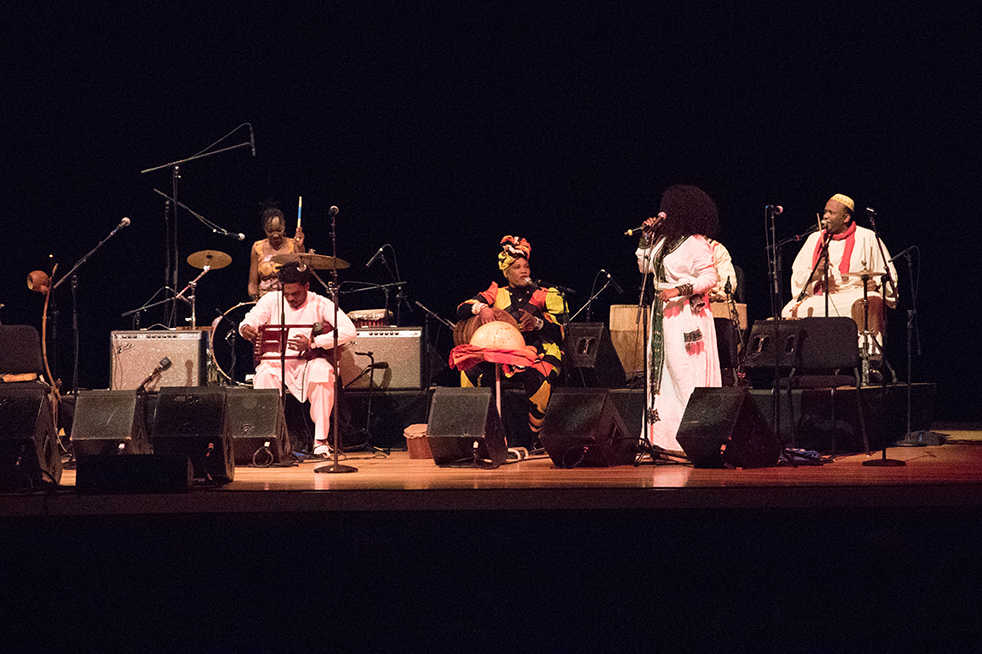When one plans to attend a performance by an East African band at a university theatre, he expects a sophisticated evening full of thoughtful cultural appreciation. Those who showed up to Georgia State’s Rialto theatre on Jan. 28 expecting such an experience from the Nile Project were in for a pleasant surprise.
The Nile Project, a multinational and multicultural group of musicians who collaborate to encourage cooperation among the nations that straddle and rely upon the Nile River, delivered a show that was fast-paced, rhythmic and, most of all, fun. The full group consists of over 30 musicians, but only a portion of the group performed at Tech.
In their songs, which are generally long and rhythmic, but in every other respect quite diverse, the musicians wedded an upbeat vibe to a hopeful message.
Each song consisted of three or four distinct sections that bore little similarity to one another but were strung together in a long musical collage. Certain sections were upbeat and fast paced, reminding Western audiences of modern dance music, while others were soulful and passionate, reminiscent of Western music genres from soft rock to soul.
While these slower, more pensive sections often have lyrics dealing with pain, suffering and a longing for a more perfect world, the songs themselves are always framed by upbeat sections, making each track exciting and fun.
The musicians in the troupe have made it clear that their shows are intended to be fun and
entertaining, not merely serious and educational.
At times, the group called upon the audience to come to the front and dance, saving the crowd from the awkwardness of not knowing when to dance and when to sit.
Though the Nile Project has a serious objective, the musicians are free from pretension. From their concert demeanor it is clear that they do not want a serious, quiet audience; rather, they want an audience that has as much fun as they do. The ultimate goal of the Nile Project is to achieve progress
through entertainment.
The story and message of the Nile Project are nearly as captivating and inspiring as the music which the troupe performs. The Nile Project began in late 2010 as a multifaceted attempt at encouraging cooperation among the Nile states.
Additionally, the group aims to spread awareness of the issues facing the massive population that relies upon the Nile for its sustenance and livelihood. The project consists of three separate entities: the titular music group, a network of university chapters that educate students on Nile issues and a network of scholars and state officials who collaborate on water policy in the region.
The band, which serves as the face of the Nile Project, is a unique group of musicians from different cultural backgrounds, and they combine distinct musical traditions into one euphonic musical sensation.
The arrangements used by the Nile Project were possibly even more complex and impressive than the structure of the songs themselves.
The group consisted of 11 musicians, and while all 11 were rarely on stage at once, the sheer size of the arrangements lent the songs a volume and power that easily filled the relatively large Rialto. In addition to this power, the vast arrangements gave the songs a sonic complexity unrivaled in modern popular music.
The 12 musicians played over a dozen instruments and added vocals in ten different languages, allowing the group to construct complex and layered songs from a series of simple rhythms played on a diverse array of instruments.
Vocal styles ranged between and within individual songs, from modern pop-style singing to passionate howling, which sounded almost like an Islamic call to prayer.
The traditional African instruments played by most of the group members shared the stage with an electric guitar and electric bass, two symbols of Western pop music. This apparent juxtaposition of traditional African instruments and vocal styles with guitars and pop style singing symbolized the other goal of the Nile Project.
The Nile Project is not just about spreading hope and raising awareness: it is also about
building unity. By showing how electric guitars can complement Ouds and Krars, the group reminded its audience that though they may be different from East Africans in appearance, culture and religion, everyone is a member of the same human race.
Such a message of unity has never been more dearly needed than it is now, as Mina Girgis, the Nile Project CEO, reminded the audience at the beginning of the show. This show kicked off their American tour, but Girgis noted that the tour may be their
last here.
The Sudanese members of the band will no longer be able to enter the country due to President Trump’s recent executive orders. In such a world, everyone could use a reminder that cultural differences should be opportunities, not obstacles.
